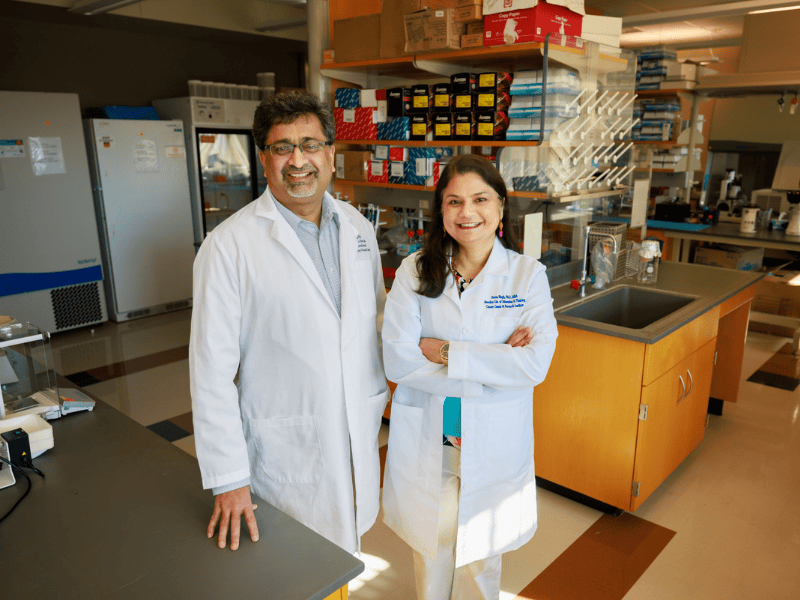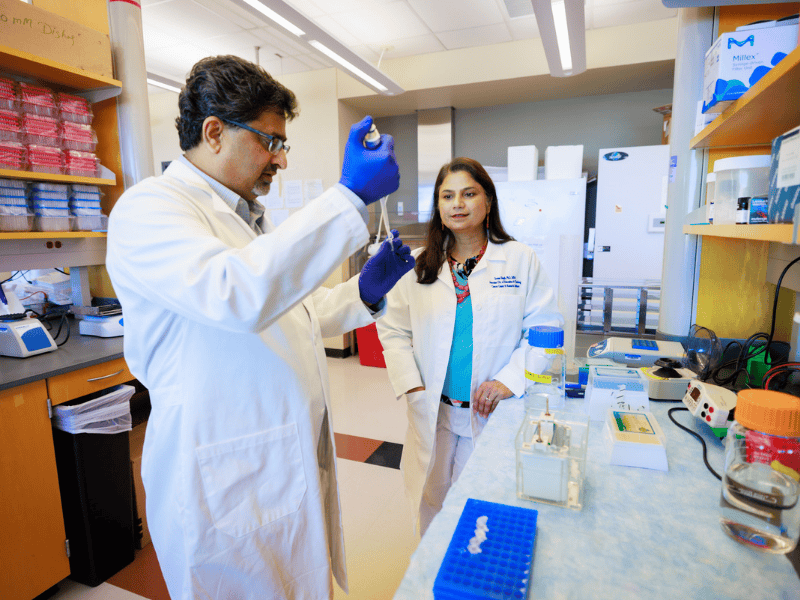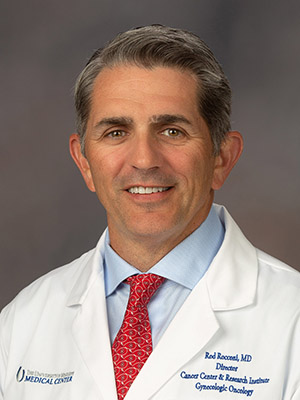Couple’s dynamic partnership advances cancer research, addresses health disparities

Dr. Ajay Singh, professor of cell and molecular biology and associate director of basic and translational research at UMMC Cancer Center and Research Institute, recalls the spark that ignited his lifelong fascination with cancer research.
“I’ve always had a curious mind and passion for exploration. The more complex a problem, the more it piques my interest. So, when I started learning about cancer in my college years, its complexity as a disease drew me towards it to understand how it initiates, progresses and how cancer cells overcome challenges that they face during their progressive journey,” he said.
For Dr. Seema Singh, professor of cell and molecular biology and associate director of education and training at the CCRI, the passion for science began much earlier.
“Going back to my childhood, I was always, always interested in science,” she said. “I knew from a young age that I wanted to be a scientist.”
The Singhs have brought their innate curiosity to CCRI as the Medical Center works toward building a top cancer care and research center, and they are already demonstrating how a mutual passion and commitment to advancing research can create valuable contributions in medicine and science here in Mississippi. From growing the cancer research enterprise to collaboration on a new graduate educational program, the Singhs have set their sights on making a difference.

The Singhs are committed to addressing health disparities from multiple angles beginning with the population and extending to biology and health care. One of their top priorities is to improve these areas by reducing disparity gaps in incidence rates and outcomes.
“Now I have the opportunity to test myself again and contribute to the growth of the CCRI. Leveraging on my research skills and experience of both failures and successes, I want to help build the research enterprise—recruiting talented people and finding a direction where we can achieve success,” said Ajay Singh.
"I’ve found that we truly have a great environment and ample opportunities to grow as scientists. It allows us to do meaningful work, generate new knowledge, and ultimately give back to the community," said Seema Singh.
Exploring health disparities in the community is the focus for the Singhs, particularly as Mississippi has the highest cancer mortality rate in the nation. Mississippi also joins Louisiana and Arkansas as southeastern states that do not have a National Cancer Institute-designated center. Currently, there are 72 NCI cancer centers across the nation. NCI designation means a center has met federal standards for research, patient care and cancer prevention.
"There are certain cancer types and specific areas where cancer incidence is particularly high. This is something we are committed to addressing ‒ focusing on health disparities from various angles, starting with the population and moving to biology and health care. Our goal is to improve these areas, filling the disparity gaps in both incidence rates and outcomes. This will be one of our top priorities," said Ajay Singh.
The Singhs’ journey as collaborators in cancer research began in an unexpected way. Despite attending the same university (Aligarh University) for undergraduate studies, their paths didn’t officially cross until graduate school. It was during doctoral training that a mutual connection, a friend working in a lab next to Ajay’s, introduced him to Seema.
Eventually, their friendship blossomed into an enduring research partnership. The two were married in 2000, even before completing their graduate studies. In early 2001, they submitted their theses. Shortly after, the couple began a new chapter by moving to the United States to further their academic and research careers.
Their first stop was the University of Nebraska Medical Center and its affiliated NCI-designated Eppley Cancer Institute, where they started their postdoctoral training. Seema was learning how the estrogen metabolites may be involved in breast carcinogenesis, while Ajay Singh engaged in a project that dealt with the role of mucins in cancer.
“Mucins are glycoproteins that form mucus, the slippery substance in saliva and other parts of the body. They’re essential for our normal functioning and protect us from infections and injuries. However, the same mucins, when aberrantly expressed or structurally modified, can also help cancer grow faster and disseminate from one site to another,” he said.
Ajay Singh’s research helped establish how some specific mucins help these processes and demonstrated their significance as potential cancer biomarkers and therapeutic targets.
Meanwhile, Seema Singh expanded her interests and started researching chemokines, proteins which are vital to inflammation. Her research demonstrated the role of a chemokine and its receptors in the pathogenesis of melanoma, the aggressive type of skin cancer. When she attained a faculty position and started her independent research lab, she started collaborating with her husband, and together, they established a novel role of chemokine and receptor-mediated signaling in the chemoresistance of pancreatic cancer.
“Pancreatic cancer is a highly lethal malignancy. Besides being diagnosed at an advanced stage, it is also unusually resistant to chemotherapy,” said Ajay Singh.
While it was known that chemokines can aid in metastasis, the team of two sought to explore an overlooked question: could these chemokines also contribute to chemotherapy resistance? Their collaborative efforts not only answered this research question, but resulted in five-year grant funding from the NCI.
Ajay Singh shared how the fluid nature of science led them to breakthroughs in cancer research and helped them attract substantial funding.
“Oftentimes, it is the unanticipated findings that open up new research directions,” he said. “In science, the key is how you approach the problem, analyze it, and devise creative solutions. I think one of the reasons we’ve been successful in the field (cancer research) is our ability to interpret data in innovative ways and being able to connect the dots between the information we generate and that produced by others in the lab.”
Their collaborative efforts have produced more than a hundred publications and over $15 million in grant funding, mostly from the NCI. They also secured multiple patents and co-founded a start-up company, Tatva Biosciences, to commercialize their lab findings.
As the years rolled by, Ajay and Seema Singh excelled in their careers, growing as scientists and leaders in their field. They advanced through academic ranks, moving from assistant to associate and then to full professors. He gained valuable leadership experience while leading a cancer biology program at the Mitchell Cancer Institute and serving as the director of the research division in the Department of Pathology at the University of South Alabama. She also pursued her passion, focusing her work on breast cancer, as well as addressing health disparities.
In preparation for the NCI designation submission process within the next five years, CCRI must meet rigorous eligibility requirements, including securing $10 million in cancer-focused research funding from recognized agencies such as the National Institutes of Health, Department of Defense and American Cancer Society among others. To achieve this goal, CCRI will need to recruit additional research faculty members who can contribute to attracting these grants.

“Ajay and Seema Singh are tremendously talented scientists, but it's their level of dedication and determination in addressing the unknowns in cancer research and finding solutions to these challenging areas that truly stands out. My goal is to support them in mentoring our talented scientists we currently have working in cancer research and to help them identify individuals who can strengthen our program. I’m truly grateful to have Ajay and Seema on our team, and I look forward to the impactful research they will produce to help drive the mission of our growing Cancer Center,” said Dr. Rodney Rocconi, CCRI director and Ergon Chair for Cancer Research.
A critical part of the expanding Cancer Center is the implementation of a new graduate cancer biology track set to begin in the fall of 2025. The track supports UMMC's efforts to achieve NCI designation, which prioritizes maintaining a robust education program.
Supported by Dr. Michael Garrett, chair of the Department of Cell and Molecular Biology, Dr. Michael Hebert, CMB graduate program director and the School of Graduate Studies in the Health Sciences, the track includes a new Cancer Biology and Therapeutics course that integrates basic and translational aspects of cancer biology, cancer genetics, cancer biomarkers and therapeutics.
“The new graduate program track broadens our education and training portfolio, providing the students with dedicated training in cancer biology. It prepares students for emerging trends in cancer biology and therapy, covering cutting-edge topics to address the challenges and opportunities in this rapidly evolving field,” said Seema Singh.
“We aim to develop leaders who will make a lasting difference in the fight against cancer through groundbreaking research, education and innovation in cancer biology and therapeutics. By training the next generation of scientists, we aim to shape a future where cancer is manageable, treatable and preventable,” she said.
The Singhs’ commitment to mentorship and scientific growth extends to their two daughters, Aastha, their youngest, and Shubha, their eldest. Shubha began her scientific journey in elementary school.
“She did a research project on how handwashing gets rid of bacteria,” said Seema Singh. “She took samples from her hands, before she washed them and after, and grew cultures. She presented on how hygiene can keep us healthy and won the first-place award.”
Now, she is set to begin her journey at UMMC School of Medicine in the fall of 2025.
Ajay Singh is confident that the Cancer Center is on the right path toward addressing health disparities in underprivileged communities across Mississippi. The Singhs are hopeful about their futures here and the potential for improving cancer care and research.
“By sharing our story, we hope to attract potential candidates to join us,” he said. “Down the road, maybe five to 10 years from now, I want to look back and say, ‘We did that. We helped build something great.’”


